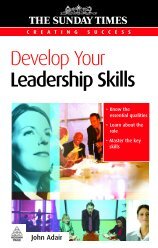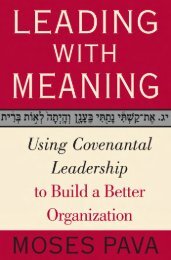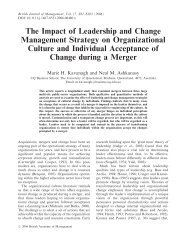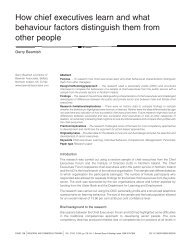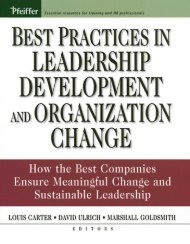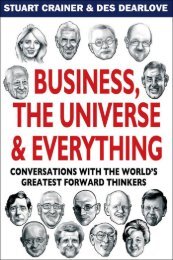- Page 4:
Copyright © 2001 by McGraw-Hill. A
- Page 14:
➠ 8.4 Levels of Communicating: De
- Page 18:
➠ 13.9 Human Capital: Truly the M
- Page 22:
1.10 The GAS model: Designing pract
- Page 26:
S ECTION 5—TOOLS FOR L EADING C H
- Page 30:
7.8 Affinity diagrams: Organizing m
- Page 34:
10.9 Making information visible 323
- Page 38:
13.8 Job Competencies: Measuring an
- Page 42:
HOW TO USE AND BENEFITFROM THIS BOO
- Page 46:
locate and use the exact tool for y
- Page 50:
If your need is:Look for these reso
- Page 54:
The Leadership GurusJohnson, BarryJ
- Page 58:
ACKNOWLEDGMENTSA book is never the
- Page 62:
1.1L EADERSHIP IN THE T WENTY-FIRST
- Page 66:
Information[☛ 2.2 7S Model]Leader
- Page 70:
H OW TO USE THIS LEADERSHIP TOOL“
- Page 74:
1.3H OW E FFECTIVE L EADERS A CT: A
- Page 78:
F OUR STEPS TO IMPROVING YOUR LEADE
- Page 82:
Challenge and support,but don’t p
- Page 86:
R ELATED LEADERSHIP TOOLS1.5 Seven
- Page 90:
Fosterinterdependence.(Think win-wi
- Page 94:
1.6 L EADERSHIP: THE B OARDS OF P L
- Page 98:
2. Are you satisfied with leadershi
- Page 102:
Leadership starts at the top, be th
- Page 106:
4. Follow through by holding leader
- Page 110:
R ECURSIVE M AXIM #1The best way to
- Page 114:
WEB WORKSHEETTake a few minutes to
- Page 118:
Work designWhat challenged theparad
- Page 122:
R ELATED LEADERSHIP TOOLS1.1 Twenty
- Page 126:
development paths of all positions
- Page 130:
1.11I NTEGRITY: GUT-LEVEL E THICSCo
- Page 134:
What actions will you take to begin
- Page 138:
2.1 I NTRODUCTION TO S YSTEMST HINK
- Page 142:
H OW TO USE THIS LEADERSHIP TOOL“
- Page 146:
4. As above, examine the subsystems
- Page 150:
This graphical illustration of a mi
- Page 154:
2.3 D IRECTIONAL S TATEMENTS:T HREE
- Page 158:
➌➍Next, have the group come tog
- Page 162:
H OW DOES A VISION STATEMENT FIT WI
- Page 166:
R ELATED LEADERSHIP TOOLS1.10 The G
- Page 170:
Step ➌Communicatingand modelingva
- Page 174:
The values you currently practiceTo
- Page 178:
N ESTEDPURPOSESA specific purpose k
- Page 182:
2.7 W RITING C LEAR G OAL S TATEMEN
- Page 186:
GoalKeyActionItemsGoal #2IntentGoal
- Page 190:
Internal Process MeasuresEmployee a
- Page 194:
3TOOLS FOR STRATEGICTHINKINGWith th
- Page 198:
Michael Traceyand FredWiersmaJames
- Page 202:
Mintzberg, Henry. The Rise and Fall
- Page 206:
their product or service no longer
- Page 210:
3.3 SWOT: STRENGTHS, WEAKNESSES,O P
- Page 214:
strategy clarification. Having said
- Page 218:
Designing the Value ConstellationTh
- Page 222:
3.5 S TRATEGIC R ESOURCING: DEFININ
- Page 226:
High Value-Added or Business Necess
- Page 230:
3.6S TRATEGIC R ELATIONSHIPS: ANALY
- Page 234:
I NCREASING V ALUE-ADDED W ORKNeces
- Page 238:
AppropriateorganizationalcultureApp
- Page 242:
3.8P ARTNERING FOR S UCCESS: JOINT
- Page 246:
StrategicYour proposeddimension Key
- Page 250:
3.9M ARKETING A P ROFESSIONAL S ERV
- Page 254:
G ETTING THE PROCESS STARTEDAs a wa
- Page 258:
4TOOLS FOR DESIGNINGPRODUCTIVE PROC
- Page 262:
A N ORGANIZATIONAL DESIGN MODELAll
- Page 266:
WEB WORKSHEETWho You ServeThe Exter
- Page 270:
Mid-level leaderFrontline leaderSen
- Page 274:
4.3 B USINESS P ROCESS R EENGINEERI
- Page 278:
❑❑❑❑Form a steeringcommitte
- Page 282:
4.4 E MPLOYEE I NVOLVEMENT:A RANGE
- Page 286:
The guideline What to look for Rema
- Page 290:
1. What is the probable level of in
- Page 294:
➠➠➠➠thrive; inappropriate a
- Page 298:
Need to Start Need to Stop Need to
- Page 302:
In Jack Stack’s Springfield Reman
- Page 306:
WEB WORKSHEETLeadershipAction plans
- Page 310:
4.7J OB S ATISFACTION: INVOLVING W
- Page 314:
5. Meaningful work• Your work has
- Page 318:
3. Clarify limitations on the CEO
- Page 322:
4.9U SING P ROFESSIONAL E XPERTISE:
- Page 326:
❑ What concerns do you each have
- Page 330:
Act on survey results and changes p
- Page 334:
Questionnaire designWhat elements o
- Page 338:
5.1L EADING C HANGE: A CHANGE E QUA
- Page 342:
5.2 L EADING M A JOR C HANGE IN Y O
- Page 346:
R ELATED LEADERSHIP TOOLS5.1 Change
- Page 350:
➢➢➢If the Readiness Index is
- Page 354:
H OW TO USE THIS LEADERSHIP TOOL“
- Page 358:
5.5C HANGE W INDOW: A BALANCED A PP
- Page 362:
1. On balance, quadrants ➊ and
- Page 366:
Past experience in your organizatio
- Page 370:
5.7S T AKEHOLDER G ROUPS: UNDERSTAN
- Page 374:
H OW TO USE THIS LEADERSHIP TOOL“
- Page 378:
5.8H UMAN T RANSITIONS: HELPING P E
- Page 382:
Endings Turmoil period New beginnin
- Page 386:
1. Initially, treat the other peopl
- Page 390:
5.10 A PPRECIATIVE I NQUIRY:B UILDI
- Page 394:
• Explore the strengths and past
- Page 398:
6.1 T HE BS DETECTOR K IT:R ECOGNIZ
- Page 402:
❑❑❑If there’s a chain of ar
- Page 406:
A SSUMPTIONCertainMATRIXTriviaImpor
- Page 410:
6.3 S ORTING O UT C OMPLEX S ITUATI
- Page 414:
WEB WORKSHEETBrainstorm and list th
- Page 418:
D ANGER!—CAVEATIn cases in which
- Page 422:
R ELATED LEADERSHIP TOOLS6.3 Comple
- Page 426:
H INTS• This tool is easy to use
- Page 430:
6.6O PTIMIZING Y OUR T HINKING—A
- Page 434:
Green(creative, newideas)[☛ 6.7 C
- Page 438:
Using MetaphorsBlue-Skying/No Const
- Page 442:
How skilled are you as a changelead
- Page 446:
P ARTIAL EXAMPLE: LEADERSHIP DEVELO
- Page 450:
6.9B RAINSTORMING: GENERATING I DEA
- Page 454:
• Ask people to post their ideas
- Page 458:
7.1R EFRAMING: WORKING THE R EAL P
- Page 462:
H OW TO USE THIS LEADERSHIP TOOL“
- Page 466:
7.2 A GENERAL P ROBLEM-S OLVINGM OD
- Page 470:
❑❑Integrate with the workgroup
- Page 474:
Step ➌ Every problem leaves a dis
- Page 478:
WEB WORKSHEETF INDING C AUSE W ORKS
- Page 482:
7.4 P OLARITIES: DEALING WITHI NTRA
- Page 486:
P OLARITY M AP W ORKSHEETPole 1: Po
- Page 490:
➎ Assess the risks and the limita
- Page 494:
Assess risks and limitations for ea
- Page 498:
➍AssessRisk✔ For each potential
- Page 502:
R ELATED LEADERSHIP TOOLS6.2 Assump
- Page 506:
The QualityTool What it is and what
- Page 510:
✔✔✔✔✔Leaders need to be a
- Page 514:
P ROCESSSTEPSStep❶ Materials❷ D
- Page 518:
WEB WORKSHEETNow think of situation
- Page 522:
8.1P OWERFUL L EADERSHIP C ONVERSAT
- Page 526:
2. Information(gleaned from data)3.
- Page 530:
8.2 D IRECT L EADER- TO-EMPLOYEEC O
- Page 536:
8.3 T HE L EADER’ S R OLE INO RGA
- Page 540:
WEB WORKSHEETUse the template provi
- Page 544:
Dialogue is about thinking together
- Page 548:
8.5M ETACOMMUNICATING: TALKING ABOU
- Page 554:
8.6C OMMUNICATION 101: DEALING E FF
- Page 558:
WEB WORKSHEETList strengths that yo
- Page 562:
can speak, use the extra processing
- Page 566:
8.8 L ISTENING T ECHNIQUES: TACTICS
- Page 570:
R ELATED LEADERSHIP TOOLS8.1 Conver
- Page 574:
• Getting down to workimmediately
- Page 578:
8.10M EDIA R ELATIONS FOR L EADERSC
- Page 582:
The media tends to be thought of as
- Page 586:
9.1 L EADERSHIP V ERSATILITY:M ATCH
- Page 590:
5. If there is an inconsistency in
- Page 594:
One very popular situational leader
- Page 598:
R ELATED LEADERSHIP TOOLS4.7 Job Sa
- Page 602:
➟Step ❸Postdelegationfollow-thr
- Page 606:
9.4I NCREASING Y OUR I MPACT: UNDER
- Page 610:
What actions could you take if you
- Page 614:
3. INVENT NEW ALTERNATIVES TO FULFI
- Page 618:
R ELATED LEADERSHIP TOOLS1.6 Boards
- Page 622:
Step ❻PresentationClose➠ Summar
- Page 626:
9.7 S ELLING W HEEL: GETTING Y OURR
- Page 630:
WEB WORKSHEETG ETTING Y OUR R ECOMM
- Page 634:
In his best-seller, The Spin ® Sel
- Page 638:
Ferret out the benefits and value a
- Page 642:
in knowledge-based, fast-moving, cu
- Page 646:
9.10S UPPORT N ETWORKS: THE S ECRET
- Page 650:
Type of supportPeople who presently
- Page 654:
10.1 H IGH-PERFORMING T EAMS:O RGAN
- Page 658:
H OW TO USE THIS LEADERSHIP TOOL“
- Page 662:
Sources of increased team IQLearn f
- Page 666:
4. Commit to implementing one to th
- Page 670:
H OW TO USE THIS LEADERSHIP TOOL“
- Page 674:
10.4I NCLUSION, CONTROL, AND A FFEC
- Page 678:
R ELATED LEADERSHIP TOOLS8.1 Conver
- Page 682:
The need to deal with unresolved I
- Page 686: 10.6A SSESSING Y OUR G ROUP L EADER
- Page 690: Group leadership development needsS
- Page 694: H OW TO HANDLE PARTICIPATION IN A G
- Page 698: 10.8G ROUND R ULES: HELPING G ROUPS
- Page 702: WEB WORKSHEETDevelop a few critical
- Page 706: key words from a complex idea, and
- Page 710: 10.10C LOSURE: HELPING G ROUPS M AK
- Page 714: A decision that will needto be made
- Page 718: Method Best used when How toLogical
- Page 722: 10.12RASCI: A PLANNING T OOLFOR W O
- Page 726: 3. Decide on a format and complete
- Page 730: 11.1P ROCESS C YCLE: PLANNING E FFE
- Page 734: ➌ Steps(Brainstorm steps, thenput
- Page 740: What key functions are served by ou
- Page 744: ❑ Quickly refine the purpose, goa
- Page 748: 5. Following up on action plans dev
- Page 752: 11.4 M EETING R OLESInspired by Ric
- Page 756: TimekeeperProcess Advisor (meeting
- Page 760: Keeping the meeting on track:❑ Ge
- Page 764: 11.6 T HE M EETING A GENDA:W HY, WH
- Page 768: Person Time Measurable/observableAg
- Page 772: ➍Agree onthe Agenda➟❑❑❑Di
- Page 776: 11.8 T HE M EETING M INUTES:W HY, W
- Page 780: Agenda item Meeting decision and/or
- Page 784: 12.1 T HE R ELATIONSHIP B ANK:M AIN
- Page 788:
3.4.5.Copyright McGraw-Hill 2000. O
- Page 792:
Trusting otherspredisposes them tot
- Page 796:
12.3T RIANGULATION: THE S UREST W A
- Page 800:
Note a couple of ways you can you h
- Page 804:
H OW TO USE THIS LEADERSHIP TOOL“
- Page 808:
12.5 P REPARING Y OURSELF TOG IVE N
- Page 812:
2. What specifically do you want th
- Page 816:
➍ConfrontConsequences➟➎Conclu
- Page 820:
12.7 C ONFLICT: FIVE L EVELS FORD E
- Page 824:
WEB WORKSHEETBest resolutionConflic
- Page 828:
the gang. Challenge Insecure Aggres
- Page 832:
12.9T HE E SSENTIALS OF C USTOMER S
- Page 836:
Current description(as of date: ___
- Page 840:
13.1 C OACHING AND S UPPORTINGTHE S
- Page 844:
➋Assessing andbenchmarking➌Esta
- Page 848:
13.2 C OACHING H IGH-PERFORMERS:A N
- Page 852:
paths to success, solidify old skil
- Page 856:
13.3A CCOUNTABILITY A GREEMENTS: DE
- Page 860:
AccountabilitiesI am personally acc
- Page 864:
➋➌➍➎Key Result Areas (KRAs)
- Page 868:
➎ Action PlansCopyright McGraw-Hi
- Page 872:
NotImportantActivities➌Activities
- Page 876:
13.6A TTRIBUTION T HEORY: ASSESSING
- Page 880:
The attributions others might make
- Page 884:
✔✔✔✔✔✔required for high
- Page 888:
13.8J OB C OMPETENCIES: MEASURING A
- Page 892:
WEB WORKSHEETJob: _________________
- Page 896:
ience, education, and training.”
- Page 900:
13.10 T HE F OUR S TAGES® M ODEL:U
- Page 904:
4. What barriers does this person n
- Page 908:
Expertise Key relationship Typical
- Page 912:
14TOOLS FOR LEARNINGChange is takin
- Page 916:
ScarcityAbundanceAppropriate UsesSc
- Page 920:
14.2S INGLE-LOOP AND D OUBLE-LOOP L
- Page 924:
List one or two key reasons why you
- Page 928:
Level ofvaluationA. PreparationB. T
- Page 932:
Improve your own leadership practic
- Page 936:
H OW TO USE THIS LEADERSHIP TOOL“
- Page 940:
14.5T EACHING A J OB: AN E S SENTIA
- Page 944:
Major learning steps Bite-size lear
- Page 948:
What are the practical implications
- Page 952:
14.7P ERSONAL P REFERENCES: CAPITAL
- Page 956:
LeaderDirectreportIssues that might
- Page 960:
15.1B ALANCE: TAKE C ARE OF Y OURSE
- Page 964:
3. Nurturing my close relationships
- Page 968:
15.2 LEQ: THE L EADERSHIPE MOTIONAL
- Page 972:
Emotional competency My assessment
- Page 976:
15.3T HE J OHARI W INDOW: WHAT Y OU
- Page 980:
Things TheyDon’t KnowThings I kno
- Page 984:
In the example here, Lee is a Sr. V
- Page 988:
Use these questions to assess your
- Page 992:
15.5H ABITS: THE G OOD AND B AD N E
- Page 996:
FeelingBuild on the positive: What
- Page 1000:
H OW TO USE THIS LEADERSHIP TOOL“
- Page 1004:
S TRESS HAS BOTH FINANCIAL AND HUMA
- Page 1008:
R ELATED LEADERSHIP TOOLS4.7 Job Sa
- Page 1012:
Contingency leadership model, 267-2
- Page 1016:
Quality, tools for ensuring, 199-23



